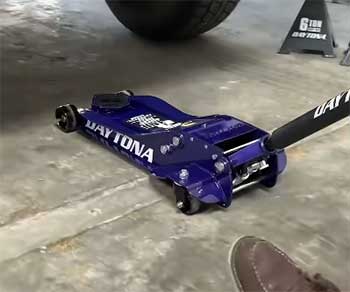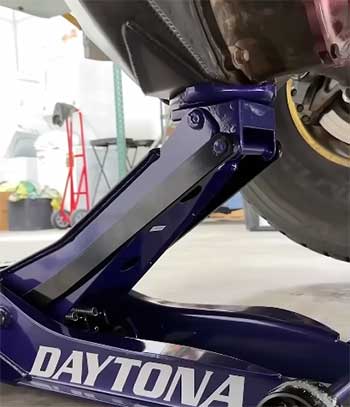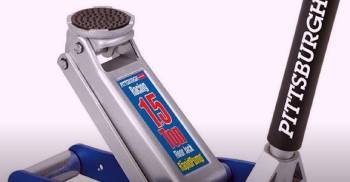If you’re caught between Daytona and Pittsburgh when choosing a floor jack, I’ve been exactly where you are.
After wrenching on cars for years and trying both brands in my own garage, I decided to lay it all out here.
This article is for anyone stuck deciding which jack to spend their hard-earned money on.
I’ll give you the real story—what works, what doesn’t, and which one I’d trust under my car again.
Daytona Vs. Pittsburgh Jack Comparison Table
| Feature | Daytona Floor Jack | Pittsburgh Floor Jack |
| Manufacturer | Harbor Freight (premium line) | Harbor Freight (value line) |
| Lifting Capacity | 2–4 ton options | 1.5–3 ton options |
| Build Material | Mostly steel; reinforced components | Steel construction, lighter frames |
| Design Inspiration | Based on Snap-On design | Original in-house design |
| Lift Speed | Quick-lift dual piston | Standard single or dual piston |
| Weight | Heavier, more solid base | Lighter, more portable |
| Price Range | Mid-range | Budget-friendly |
| Warranty | 3-month standard, extended optional | 90-day limited warranty |
| Known Issues | Bulkiness for compact spaces | Seal wear, occasional leaks |
| Overall Durability | High under regular use | Average, best for occasional use |
My Personal Experience With Daytona and Pittsburgh Jacks

When I first got into wrenching on cars at home, like most folks, I started with the Pittsburgh 3-ton floor jack. At around $100, it felt like a steal.
It looked solid, lifted quick enough, and did the job for basic tasks like brake jobs and oil changes.
But after about a year of regular use, I noticed it started feeling less smooth, especially during the initial lift. It also leaked slightly from the seal after a cold winter.
So, I decided to upgrade and bought a Daytona 3-ton low-profile jack. Right out of the box, the difference in build quality was obvious.
The frame was heavier, more reinforced, and the dual-piston lift was incredibly smooth.
I didn’t have to pump nearly as much to get the car up, and it felt safer with how solidly it sat once lifted.
In real-world use, the Daytona handled everything I threw at it—lowered cars, SUVs, even a couple of trucks.
It rolled better on my garage floor, had a wider base for stability, and the release valve gave me fine control when lowering the car.
That’s something the Pittsburgh jack always lacked—it would either hold or slam down.
Over time, the Pittsburgh jack sat in the corner collecting dust while the Daytona became my go-to. It’s not that the Pittsburgh is useless.
For someone doing occasional weekend maintenance or working with a lighter sedan, it’ll hold up fine.
But once you start demanding more frequent and varied use, you’ll find the weaknesses show.
That’s when you realize a jack isn’t just a tool. It’s something your life could depend on—so the better one is always worth it.
Pros and Cons of Daytona Floor Jack

Pros:
- Heavy-duty construction provides long-term durability
- Smooth and fast lifting with dual-piston design
- Wide base increases stability on uneven garage floors
- Low-profile design fits under lowered vehicles
- Better control on lowering thanks to refined release mechanism
- Solid steel wheels and reinforced side plates reduce wobble
Cons:
- Heavier to move around or store
- Costs more than entry-level jacks
- May be overkill for light-duty or infrequent users
- Bulk can be an issue in tight garage spaces
Pros and Cons of Pittsburgh Floor Jack

Pros:
- Extremely affordable for budget-conscious buyers
- Lightweight and portable for quick jobs
- Available in most Harbor Freight locations
- Works fine for basic maintenance on sedans and compact cars
- Simple design with fewer components that can fail
Cons:
- Standard seals may fail with heavy or regular use
- Lift mechanism lacks finesse compared to premium models
- Narrow base can feel unstable under heavier vehicles
- Less smooth rolling on rough garage floors
- Not ideal for lowered or performance vehicles due to higher clearance
Key Differences That Actually Matter
If you’re just comparing specs on paper, both jacks lift cars and both can support similar weight classes.
But when you actually start using them, the feel is completely different.
The lift action on the Daytona is much smoother, especially when under load. The dual-piston mechanism not only speeds up the lifting process but makes it feel more stable throughout the motion.
The Pittsburgh jack tends to feel jerky, and with heavier vehicles, it can struggle to lift consistently.
If you’re working on the car often, you’ll start to notice this very quickly. And trust me, when you’re under the car, you don’t want to be second-guessing your jack.
Daytona’s low-profile options are a huge bonus if you’re working on lowered cars like performance sedans or sports cars.
The Pittsburgh jack has a higher starting height, which means in many cases, I had to use ramps just to get the jack under the car.
Daytona is also more confidence-inspiring when it comes to long-term use. The materials, welds, and finish feel like they’re built to take a beating.
Pittsburgh works in the short term, but after a few harsh winters and constant use, I noticed rust and leaks on mine.
Build Quality and Design Language
Daytona jacks are modeled after Snap-On, and you can feel that influence.
Even the handle is padded better, making it more comfortable when you’re pumping the jack repeatedly. The side plates are thicker, the wheels are smoother, and the jack sits flatter on the ground.
Pittsburgh doesn’t try to compete in build refinement. It’s made for affordability, and it shows. The paint chips easier, the welds can look rushed, and the metal isn’t as corrosion-resistant.
But none of that makes it useless. For someone on a tight budget or working occasionally, Pittsburgh is still a step up from using the factory scissor jack—and much safer.
Performance Under Load
I’ve used the Daytona jack on everything from a Honda Civic to a Chevy Silverado.
It didn’t flinch.
It lifted each one with minimal effort, and what really impressed me was how easy it was to position and pump, even when I was working alone.
The Pittsburgh jack did okay with smaller vehicles, but it started showing its limits with heavier ones. It needed more pumps and didn’t always lift evenly.
With a heavier vehicle, the jack can flex just slightly under load. Not enough to break—but enough to feel it. And once you feel that flex, you’re not going to fully trust it again.
Stability and Safety
Stability matters a lot more than people think. The wider the base, the better the distribution of weight—and Daytona gets that right.
Pittsburgh is narrower and more top-heavy. On flat surfaces it’s okay, but I wouldn’t trust it on anything slightly sloped or rough.
Another safety issue is how the jacks lower the car. With the Daytona, you get a smooth, predictable release.
The Pittsburgh jack, however, can drop quicker than expected, especially if you’re not careful with the twist handle.
That’s a nerve-wracking feeling, especially if you’ve just spent an hour replacing brake pads.
Longevity and Maintenance
In terms of lifespan, Daytona jacks have lasted me years without needing any major maintenance.
A few shots of grease in the pivot points and keeping it clean—that’s it.
Pittsburgh jacks? I’ve had two over the last five years, and both started leaking fluid eventually. The seals just don’t hold up with regular use.
It’s not the end of the world—you can rebuild them—but it’s one more thing to deal with.
Also Read: Comparison Of Aqua Marine Decking Vs. SeaDek
Portability
Here’s one area where Pittsburgh might actually win for some people.
It’s lighter and easier to move around, especially if you’re loading it into a trunk or working on a mobile mechanic setup. The Daytona is a beast to carry up stairs or into tight spots.
So, if portability is critical for your setup, Pittsburgh does make sense. But for a dedicated home garage, I’d still take the heavier Daytona every time.
When to Buy Daytona
- You work on cars regularly and want something reliable
- Your vehicle is lowered or has minimal clearance
- You plan to lift heavier vehicles like trucks or SUVs
- You prefer smoother, more controlled operation
- You want long-term durability and less maintenance
When to Buy Pittsburgh
- You’re on a tight budget and need something now
- You only do light or occasional car maintenance
- You need a lighter jack that’s easy to carry
- Your vehicle doesn’t require low-profile access
- You’re not concerned about premium build materials
Also Read: My Thoughts On Daytona Floor Jack
Frequently Asked Questions (FAQs)
Yes, most Reddit users agree Daytona offers better build quality, smoother operation, and higher durability. Pittsburgh is fine for occasional use, but Daytona wins overall.
Brands like Daytona, Arcan, and Hein-Werner are often considered top picks for quality and reliability. The best one depends on your budget and intended use.
No. While Daytona jacks are modeled after Snap-On’s design, they are not made by Snap-On and do not match the same manufacturing standards or warranty.
Yes. Arcan jacks are well-respected for their build quality, lifting performance, and safety. They strike a good balance between price and reliability.
Final Thoughts
If you’re wrenching every few weeks, working on various cars, or just want a jack you can trust long-term, Daytona is the obvious choice.
It costs more upfront, but it pays off in safety, reliability, and peace of mind.
If you’re just starting out, only working on your own car, or need a backup jack, Pittsburgh still gets the job done—as long as you understand its limits.
In the end, your jack is more than a tool. It’s something your safety depends on every time you lift a car.
And after using both brands, I can honestly say if I had to choose one to keep in my garage forever, it would be the Daytona.

